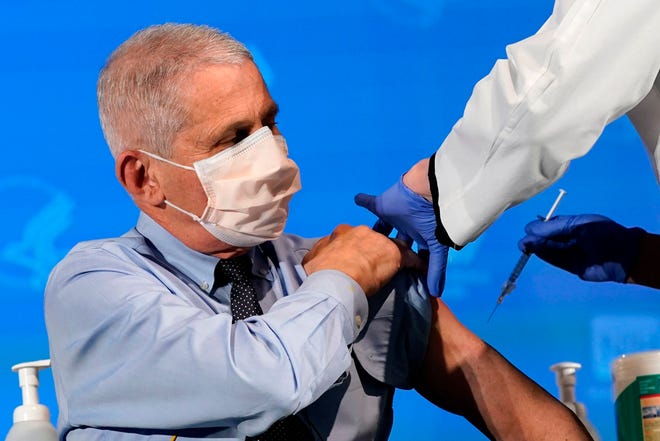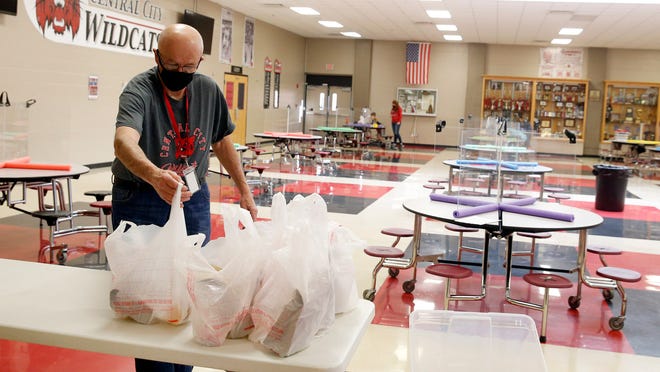Anthony Fauci gets Moderna vaccine; Senate stimulus bill
USA TODAY is keeping track of the news surrounding COVID-19 as a pair of vaccines join the U.S. fight against a virus that has killed more than 320,000 Americans since the first reported fatality in February. Keep refreshing this page for the latest updates on vaccine distribution, including who is getting the shots and where, as well as other COVID-19 news from across the USA TODAY Network. Sign up for our Coronavirus Watch newsletter for updates directly to your inbox, join our Facebook group or scroll through our in-depth answers to reader questions for everything you need to know about the coronavirus.
In the headlines:
►New York is conducting tests to ascertain whether the new coronavirus strain that’s spreading rapidly in the United Kingdom has reached the state, Gov. Andrew Cuomo said. All of the approximately 4,000 tests performed so far have come out negative.
►Dr. Deborah Birx, the White House coronavirus task force coordinator, told the news outlet Newsy that she intends to retire but is first willing to help the incoming Biden administration combat the pandemic.
►South Carolina Gov. Henry McMaster has tested positive for COVID-19, days after his wife, Peggy McMaster, was confirmed infected. Both tested negative eight days ago, before attending a White House party. Gov. McMaster, 73, has mild symptoms with a cough and slight fatigue and will isolate for 10 days and be monitored for additional symptoms.
►Ride-hailing company Lyft said it will provide 60 million free or discounted rides to and from vaccination sites for low-income, uninsured and at-risk communities.
►Dr. Anthony Fauci, the head of the National Institute of Allergy and Infectious Diseases, gave two thumbs-up after being vaccinated Tuesday. “I want to encourage everyone who has the opportunity to get vaccinated so that we can have a veil of protection over this country that will end this pandemic,” Fauci said.
►The COVID-19 relief package was designed to throw a financial lifeline to Americans struggling because of the pandemic, but a break for CEOs is drawing scrutiny: business meal deductions. President Donald Trump says it will help struggling restaurants.
►2020 has been the deadliest year in U.S. history, and deaths are expected to top 3 million for the first time, mainly because of the pandemic. Preliminary numbers show the country will have more than 3.2 million deaths, or at least 400,000 more than in 2019.
►An agricultural company in Washington state where two workers died from COVID-19 was fined more than $2 million, accused of repeatedly violating coronavirus safety procedures. Gebbers Farms said it disagreed with the findings and that “99.3% of our entire workforce tested negative for the virus, which is better than county, state and national rates to date.”
📈 Today’s numbers: The U.S. has more than 18.1 million confirmed coronavirus cases and 320,000 deaths, according to Johns Hopkins University data. It was only eight days ago the country reached 300,000 COVID fatalities. The global totals: More than 77.7 million cases and 1.71 million deaths.
Here’s a closer look at today’s top stories:

Our kids will be OK – if we fully support them
Nine months after COVID-19 changed everything, parents are asking the same question they asked at the start: Will my children be OK? To answer that, USA TODAY spoke with more than a dozen experts. What we heard was children need what they have always needed: caregivers who are present and emotionally available. They also need people to help them make sense of uncertainty and loss, who can help them navigate fear and change.
“Children can go through divorce, they can go through death, they can go through just an amazing array of things and come out looking pretty good, if they’ve got somebody who can support them,” said Mary Dozier, a psychology professor at the University of Delaware who studies children who have experienced adversity. Read more here.
– Alia E. Dastagir and Alia Wong
Fauci, Azar receive first dose of vaccine
Dr. Anthony Fauci and Health and Human Services Secretary Alex Azar and other top health officials received the first of two doses of the Moderna vaccine on live TV Tuesday. The National Institute of Allergy and Infectious Diseases, which is part of the National Institutes of Health, helped develop the vaccine with Moderna, which was authorized by the Food and Drug Administration for emergency use Friday. A booster dose is required 28 days after the first dose.
Today represents a “profoundly significant historical moment,” Fauci said, adding “bring it on,” as he prepared for the shot. Earlier, Fauci told ABC’s “Good Morning America” he believes vaccinating the general population will begin in late March or early April and take about four months.
Azar preceded Fauci in getting vaccinated. Azar said no corners were cut in developing and releasing the vaccine, that final decisions on safety and effectiveness were made using the “same FDA science” used for other vaccines.
“I have complete confidence in the safety and efficacy of these vaccines,” Azar said seconds before being inoculated. And after: “Thank you, NIH.”
Some states will lag in getting shots to highest-risk groups
As health care workers and nursing home residents await the first shots of the COVID-19 vaccine, which is in high demand, few realize the exact timing of their vaccination depends largely on what state they live in. That’s because the vaccine is being allocated according to the number of adults in each state, which doesn’t correlate to the number of high-risk people living or working there. In some places, medical workers and residents of long-term care facilities will be exposed to the coronavirus for weeks or months longer, and they’ll be more vulnerable to sickness and death.
Nevada will be able to vaccinate all front-line health workers and nursing home residents once the federal government distributes 13.6 million doses nationwide. But Massachusetts, which has a high number of medical workers, won’t hit that threshold until 25.5 million doses have been distributed across the country – potentially weeks into the new year.
Health and Human Services Secretary Alex Azar has touted the per-person formula as fair. “We wanted to keep this simple,” he said. Read more here.
– Dennis Wagner, Donovan Slack and Aleszu Bajak
Relief package may be too little, too late for some Black, Latino landlords
Mom-and-pop landlords, who oversee the majority of the nation’s 48-million-unit rental stock, are hurting. Black and Latino landlords are being hit the hardest, turning to forbearance at higher rates during a pandemic that has disproportionately affected their communities as their residents are unable or unwilling to pay rent under eviction moratoriums. A report by the Urban Institute found approximately 12% of landlords with a mortgage are in forbearance, meaning renter payments have been temporarily postponed. Of those landlords, 20% are Black and 14% are Latino, compared with 9% who are white.
“We’ve been living on credit cards, paper clips and chewing gum,” said Miami landlord Hector Alvarez, 62. Read more here.
– Romina Ruiz-Goiriena
More Americans warming to getting vaccinated as soon as possible
Americans’ willingness to take the coronavirus vaccine has jumped since the first two vaccines were authorized by the FDA and health care workers and nursing home residents began to receive the shots. That growing acceptance is a reassuring sign for public health experts who call distribution of the vaccine crucial to controlling a pandemic that has killed more than 320,000 people in the U.S.
In a USA TODAY/Suffolk University Poll Wednesday through Sunday, 46% said they will take the vaccine as soon as they can. That’s close to double the 26% in a USA TODAY poll in late October. In the new poll, 32% said they will wait for others to get the shots before they do so themselves.
“From what I’ve read, it’s going to take about 75% of the nation taking the vaccine in order to create herd immunity,” says Lisa McAlister, 48, a registered nurse from Grove, Oklahoma, “and quite frankly, I don’t want to live in a pandemic the rest of my life.” Read more here.
– Susan Page and Sarah Elbeshbishi
Contributing: The Associated Press

